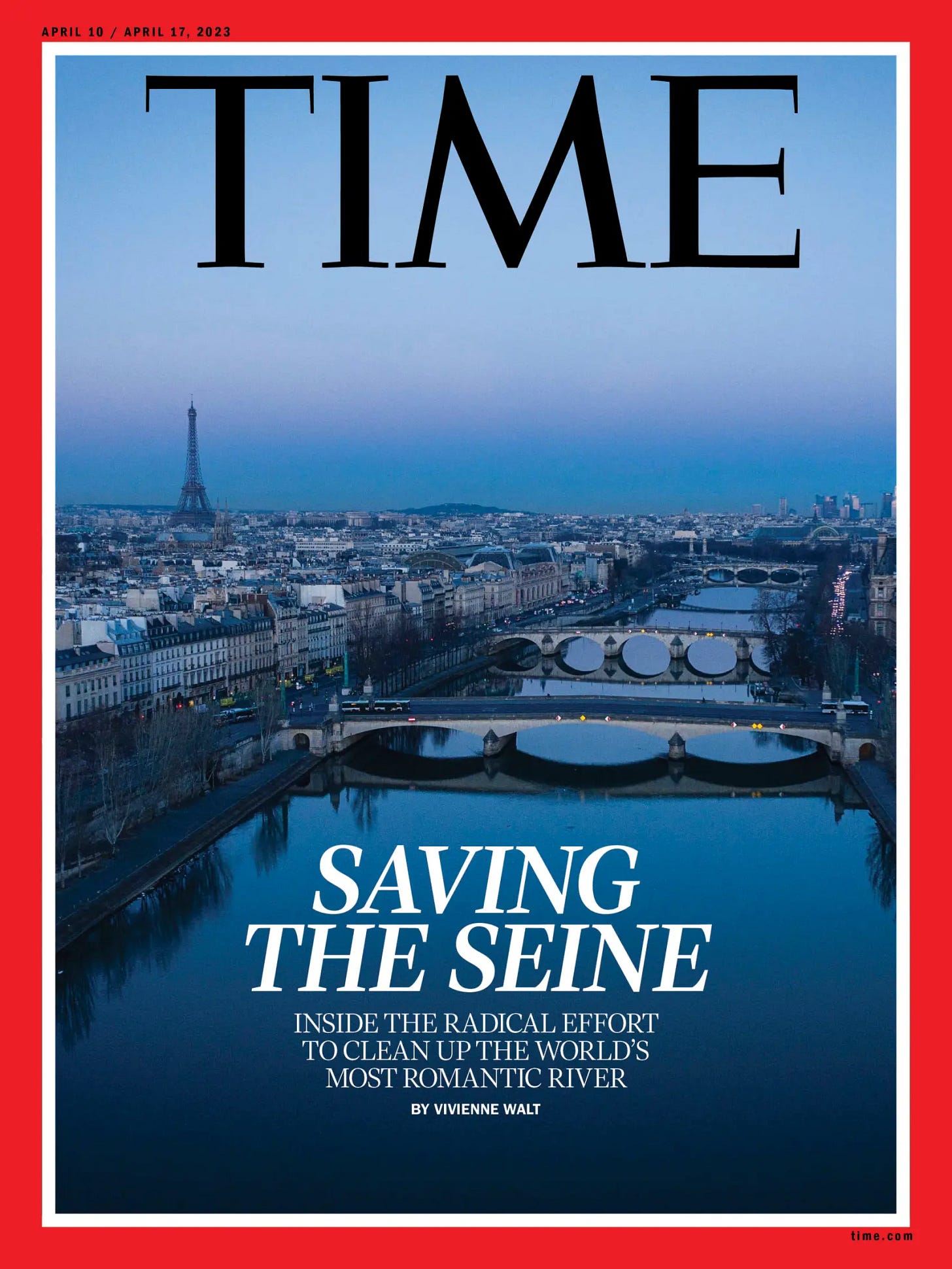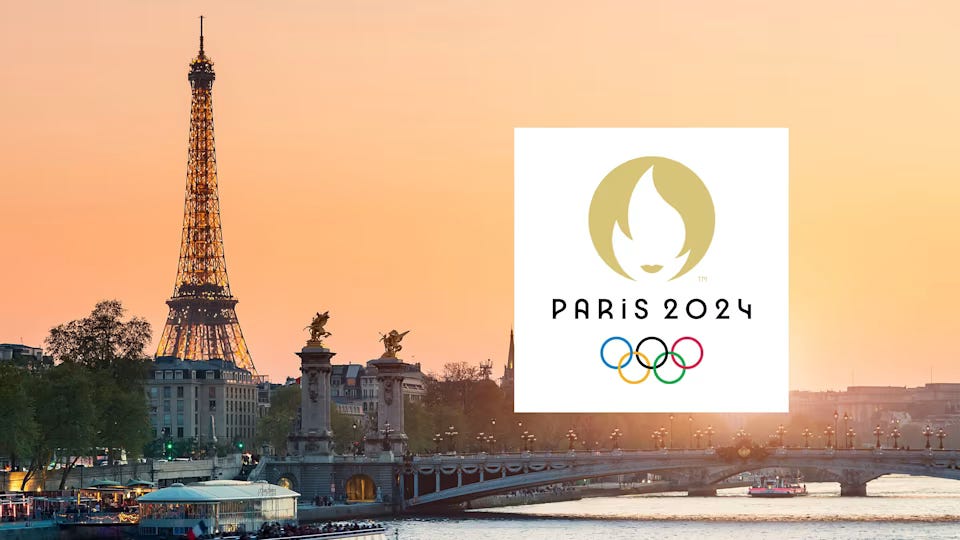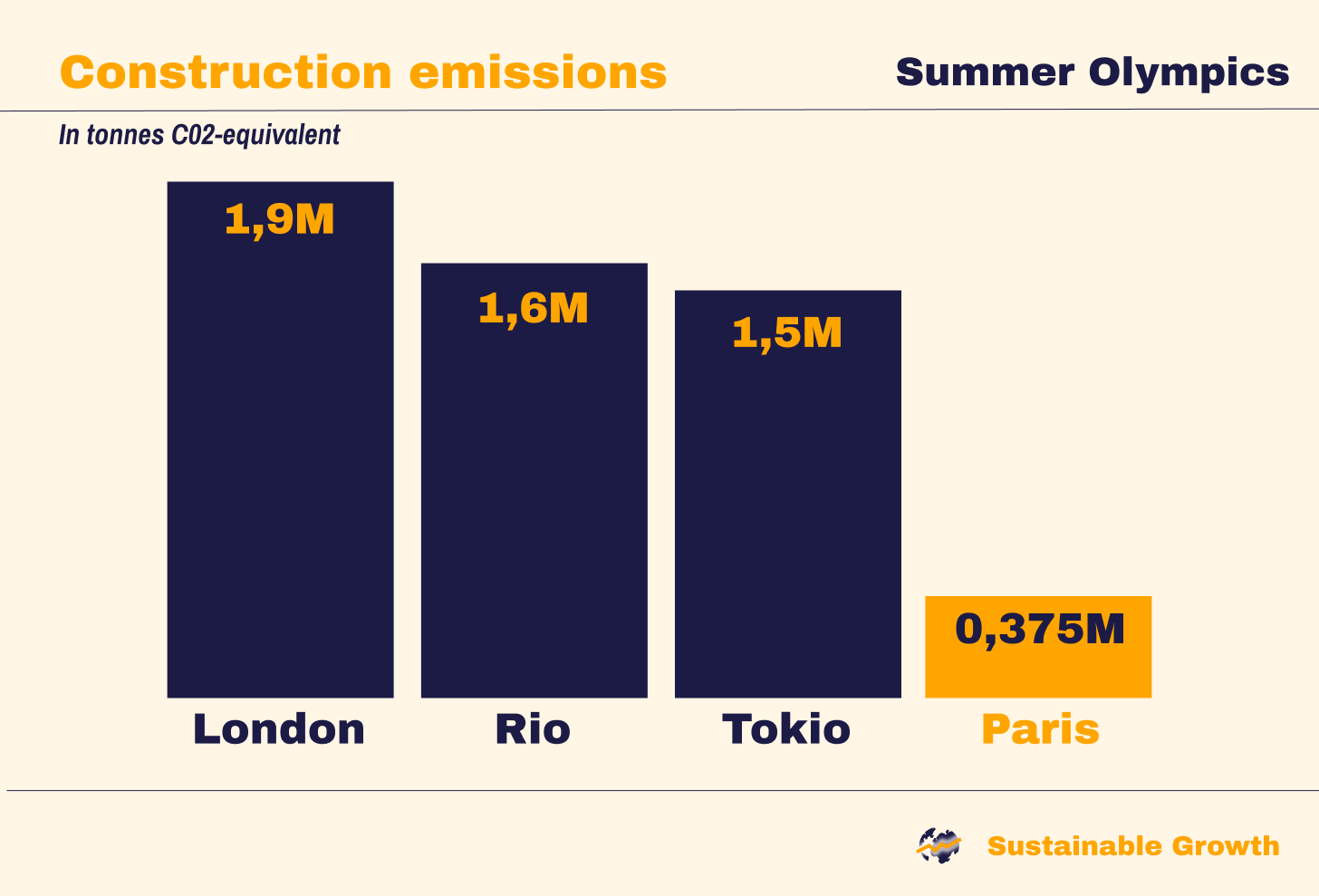The Paris 2024 Olympics | Are we able to host major events in a sustainable manner?
Will we witness a huge step in the right direction or a greenwashing festival?
👋 Hi, it’s Michiel, with a warm welcome to Martin, Daniella, Timo and 3 new subscribers who joined Sustainable Growth. It’s a pleasure to have you here.
Paris.
A marvel of a city.
It’s rich historical presence in Europe. It’s exemplary urban planning in the 19th century. It’s influence on the arts. It’s current urban transition to a low-carbon, 15-minute-city. For me, Paris is interesting on so many levels.
In about 10 weeks, on Friday 26th of July, the whole world will set its sights on Paris. For Paris will host the Summer Olympics of 2024. One of the biggest events in the world, up there with the FIFA World Cup.
Today, the Olympic Flame starts it’s journey from Olympia to Paris.

The trend of the Olympics has been ‘bigger’ and ‘better’ for over a century.
As the world population grows, as professional sports grow, as the broadcasting opportunities grow, as sponsorships and revenue grows and as sports has a powerful link to the identity of the fans.
The Olympics negative impact on our climate has kept up with this trend.
Until now.
The city that is the birthplace of the most important global climate treaty, the Paris Agreement (2015), is now the host of one the most impactful events.
Paris has made two important claims towards sustainability:
50% reduced emissions compared to earlier Rio and London editions
Overall positive contribution to the climate
Bold claims that received quite some criticism of greenwashing. To me, this seems to be the right type of ambition, but what should sustainable success look like for the Paris Olympics?
As a sports fan, I’m really looking forward to the Olympics.
As a concerned citizen, I’m really looking forward to the achievements of it’s host and what we’ll learn towards future events.
Paris ‘24 Olympics in numbers
For most athletes the Olympics are the pinnacle of their sport and career. The history, the global character, the competitive nature and the collaborative atmosphere of the Olympic Village. It all contributes to the ‘allure’ of the Olympics. Though the financial benefits are meager, the status and reputations gain is enormous.
Let’s look at some numbers to get a feel for the scale of the event.
15.500 athletes and officials will live in the Olympic Village during the games
another 9.000 will live in the village during the Paralympics
329 medal events over 32 sports
Over 15 million tickets sold for live visitors
More than 3 million extra tourists/visitors are expected to stay in Paris for at least several days, estimated to bring 3-4 billion of extra revenue to the tourism, transport and hospitality industries in and around Paris during the Games.
Over 4 billion worldwide viewers of more than 5.000 hours of sports.
A organizing budget of €4,38 billion, 96% self sufficient, only 4% from state grants
Estimated value for the Paris region is 11 billion in revenue
Ranging from preparations and construction before the Games to an expected growth of tourism as a result in the 10 years after.
CO2-budget of 1.5 million tonnes
Over 80.000 professionals and volunteers committed to their Olympic jobs
Reducing the Climate Impact
Recent editions (Rio & London) had a total emission of 3,6 and 3,3 million tonnes of CO2 respectively. Paris tries to cut that in half.
Let’s give praise where praise is due. This is the type of ambition that get’s us places. And the Paris committee made several sensible choices as a result of this commitment:
Using pre-existing sport venues (significant reduction of construction)
Only one venue is build for the Olympics, a new swimming pool
Using sustainable materials in the construction of the Olympic Village
Open water swimming takes place in the Seine river (they’ve spend 1,4 billion to clean the Seine for good, after 100 years of pollution)
Making stadium seats out of 100% recycled plastic and a event-wide ban on single-use-plastics
Hosting events at landmark sites with perfect public transport connections (like BMX/skateboarding at Place de la Concorde)
Extensive programs to resell, donate or recycle furniture after the Games and Paralympics
60% of options on the menu will be vegetarian and 25% of food served will be sourced within 250km of Paris
No airconditioning (AC) in the olympic village, but sustainable insulation and a new underground thermal cooling system will keep the athletes cool
Providing compelling train travel prices towards the fans from Germany, Netherlands, Belgium and the UK in order to avoid high emissions from short range flights
Air France, as official partner, has pledged to match all voluntary contributions made by visitors of the Games to offset emissions
The Paris Olympic committee intents to offset all emissions to an amount that the total event will have a ‘net positive’ impact
Each of these has value. And most of these are straightforward choices that have a positive impact.
However….
How do these decisions contribute to 50% emission reduction?
We don’t really know, since there is no transparant reporting on the matter.
If the ‘Greener than Ever’ really mattered, wouldn’t all efforts be transparant?
To enable future events to observe and learn, to feed critics and enthusiasts?
Transparant reporting means being accountable. In business, usually, setting strategic goals is accompanied with reports and accountability. Without accountability all targets will fail. The Paris’ committee is adamant about it’s sustainable efforts, but failed to deliver a good assessment of it’s carbon footprint beforehand.
So maybe, just maybe, the 50% is not an actual commitment, but a consequence of other factors.
Are we witnessing a clever goalsetting strategy?
What factors impact climate the most?
Paris is not comparing itself with Tokio. Why?
The Tokio Olympics were tainted by the global pandemic. As a consequence the spectators were limited. Limited to the degree that the Tokio Olympics missed out on 35%-40% of total emissions from travel (approx. 800.000 tonnes of CO2), ending up with 1,96 million tonnes of CO2 emitted.
If all went according to plan, Tokio would have ended up with a 2,7 million tonnes. Which is less than Rio (3,6m) and London (3,3m).
Some achievements of the Tokio event:
Total emissions offset was above 4,38 million tonnes. Post-event reports of the Tokio ‘20 Olympics have therefor claimed ‘beyond carbon neutral’ impact, since 4,38 million minus the actual 1,96 million emitted leaves a 2,42 million tonnes surplus in offset.
99% of non-consumable items produced for the Games were recycled or re-used.
62% of waste generated during the Games is recycled.
So, Paris wants to claim ‘overall positive contribution to the climate’ and has a predecessor that achieved just that. Paris will copy Tokio, since the only way they’re able to claim this will be by offsetting millions of carbon emissions.
They’ve stated that they’ll have a strict selection of potential offsetting partners/initiatives and will closely monitor performance. These statements hold little value.
Offsetting is not a bad thing. Not at all. All the initiatives to capture and store greenhouse gasses, in all their variety, should be supported.
It is very hard to measure the impact of offsetting, though.
That is the real problem. Most of these programs are still in their relative infancy. Like any real world plan and organisation, they face problems and unexpected outcomes. We’re nowhere near a maturity that most of the money spend in offsetting sees a direct positive impact on actual capture of CO2.
Seeing these big events committee’s claim ‘Green’, ‘Carbon Neutral’ or even ‘Climate Positive’ while accounting for these claims by funding carbon offsetting initiatives is nothing less than ‘gratuit’.
Not greenwashing per se, but very close. Dangerously close when avoiding transparant accountability on the matter.
Halftime score:
Paris 0 - 1 gratuit claims.
Let’s see if Paris can make it a tie.
Actual climate impact
How sincere is the 50% reduction target?
The Paris committee has shared some percentages on their emissions:
Transportation (34%) - 510.000 tonnes
Operation & Logistics (26%) - 390.000 tonnes
Construction (25%) - 375.000 tonnes
Digital (7%) - 105.000 tonnes
With 0,5 million tonnes for transportation, the vast majority of emissions will come from visitors flying into Paris. We haven’t found ways to fly sustainably yet, and the Paris Olympics have very little to offer in that regard… or do they?
Paris will host more visitors than Rio de Janeiro (1,7 million) and similar to London (3 million). Why will Paris be able to budget 0,5 million tonnes, where Tokio’s budget was 0,8 million and Londons was 0,9 million?
Location, location, location.
A fair share of visitors from surrounding countries will come by car or train.
London, Rio and Tokio all had limited ‘local’ or non-flying inbound options.
Paris is an enormous tourist hub and is equipped to host these numbers of visitors in relative proximity to the city centre. The expected inflow of visitors will incentivize some inhabitants to rent their homes (for approx. 3 times the regular Airbnb value) and move to the countryside for a short while.
The excellent public transportation will contribute considerable to the reduction of emissions. Certainly since it pairs so well with the most impactful decision of all: use existing venues.

The impactful choice - existing venues
So far we’ve established that Paris is pushing it’s sustainability efforts in several ways regarding the Olympics. Their emphasis on sustainable materials, recycling, reuse, green energy, a clean river and locally sourced food is admirable and should receive support.
In terms of emissions there is one clear winner: use the existing venues.
A whole ‘village’ will be build, which will be modified after the Games to become a permanent residence for 6.000 Parisians. A huge rainwater reservoir is build to avoid the sewers overflowing during excessive rains (until now polluting all open water in the process). Yet, only one new venue is build for the summer Olympics. A swimming pool.
Compared to the previous editions this is an incredible reduction in construction emissions.
At first Anne Hidalgo, the famous mayor of Paris, was reluctant to support the bid pointing at the financial position of the city. The restriction to rely mostly on existing venues, only constructing buildings for long-term use and a focus on a sustainable offer were born out of necessity. Once those were included in the bid the mayor supported it.
The financial constraints led to a frugal approach that happens to be very environmentally friendly compared to other bids and previous events.
Judgement
The decision to use existing venues was part of the bid. And we’re now seeing how impactful that can be. I’ll grant this point to Paris, making it a tie.
Score:
Paris 1 - 1 gratuit claims.
So now we’ve established that they’re mixing a well thought out, sustainable bid, with hollow claims regarding positive climate contribution.
That leaves me with some questions regarding the future. Both near and far.
What would success look like?
Loads of epic sportive successes would be nice, with new records and heroes.
Let’s answer this from a sustainability perspective.
Educate the World
Just like the previous Olympics an array of post-games reports is expected.
A detailed breakdown of climate and carbon effects would mean the world to future hosts of big events. Right now, that seems rather unlikely, since nothing substantial has been shared pre-games.
Open source those learnings, we’ve got 26 years to reach 90% emission reduction, remember the Paris Agreement? We need to know how to get there and the devil is in the details.
Support and adoption from the athletes and staff
No AC in their rooms, loads of vegetarian options on the menu and a focus on recycling. We shouldn’t forget that this is a competitive event, everything can make a difference. I hope the sustainable efforts will receive support from the athletes. If they feel that Paris has supported them in becoming the best version of themselves, we’ll probably see high adoption of these sustainable policies and activities. If they feel that Paris has put them in second place, we might see the opposite.
Support and adoption from the spectators would be very welcome, obviously.
A new standard
Success for Paris, would mean they’ve set a new standard for major events and they’ve developed a playbook for others to follow.
Will Los Angeles, the hosts of 2028, be able to undercut the total emissions of Paris?
What will the future bring?
I will risk some predictions for the next 20 years:
I think we’ll see the Olympics return to former hosts, why?
It’s the most effective use of existing infrastructure.
I think the ‘size’ of the event will only increase in regards to sports, teams, athletes and competition.
Brand-wise, revenue-wise and sponsorship-wise. To remain and further develop this ‘pinnacle of sports’ it has to incorporate more sports and competition.
I think the Olympics need to become ‘the pinnacle of digital sports consumption’ in order to vastly reduce visitor numbers.
The proximity to all these athletes at once. This festive bubble. The Olympics have a special appeal to live spectators. Rightly so.
To be able to follow, watch and support athletes in new digital ways might keep more of us at home.
I think we’ll learn to accept that certain major events won’t be climate neutral until we travel, consume and build in climate neutral ways.
Fixing the issues with offsetting might help a great deal.
We might be able to accept major events to get stuck at 70% or 80% reduction if their goals, plans and process are accounted for and shared in a transparant manner.
Time will tell, I guess.
To repeat my anticipation:
As a sports fan, I’m really looking forward to the Olympics.
As a concerned citizen, I’m really looking forward to the achievements of this host and what we’ll learn towards future events.
How do you feel about this major event?
Please forward or share this post with others that might find it interesting.











